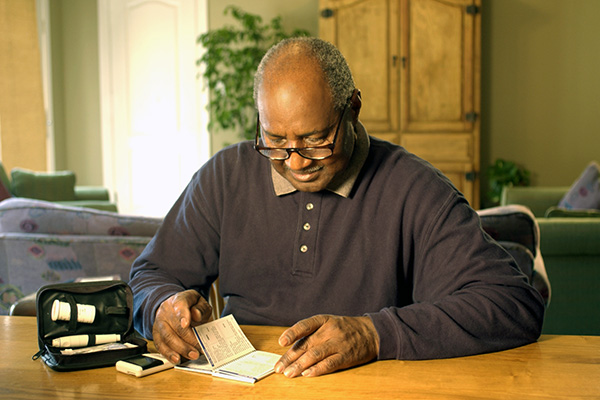What is a “Diabetes Complication”?
Reviewed by Di Bush, PhD

Untreated diabetes, both type 1 and type 2, can lead to a health problem, called a “complication“. Such health problems include heart disease, eye problems, and nerve damage. Making sure your blood glucose level is in check can help you avoid complications. You can be at higher risk for issues due to your genes, but in the end it is up to you to take control of how you eat and live to lessen your risk of a diabetes complication aka diabetes-related health problems. If you already have any, just know that as long as you catch the problems early, treatment can help.
YOUR ARTERIES
Diabetes can cause blood vessel problems such as atherosclerosis, or the build-up of plaque in the blood vessels. This build-up can affect the arteries, the blood vessels that carry blood away from the heart. Also known as large blood vessel disease, partial or total blockage of the arteries can lead to a number of health issues like angina, or chest pain, and heart attack. It is not certain why people with diabetes are more likely to get heart disease, but research has found that high blood glucose levels cause damage to the arteries.
Taking Care of Your Arteries
- Maintain good blood glucose levels.
- Don’t smoke.
- Eat a well-balanced diet.
- Keep a healthy weight.
- Stay active most days of the week.
- Check your blood pressure often.
- Visit your healthcare provider regularly to have your cholesterol and triglycerides checked.
YOUR EYES
Did you know that diabetes is the most common cause of adult blindness in the western world? Small blood vessel disease begins the process that can lead to partial, and if left untreated, total loss of vision. Retinopathy occurs when the small blood vessels in your retina, or inner lining in the back of your eye, become damaged as a result of high blood glucose levels. Because symptoms don’t arise until the advanced stages of the disease, only frequent eye exams performed by an eye specialist will detect the early stages of the disease. Laser treatment may prevent further damage if the disease is caught early.
Taking Care of Your Eyes
- Maintain good blood glucose levels.
- Have eye exams at least once a year.
- Have your blood pressure checked often since high blood pressure increases your risk of eye disease.
- Let your healthcare provider know about any changes in vision right away.
YOUR NERVES
Your nerves are covered by cells that are prone to damage if your blood glucose levels are high. Damage to your nerves, also known as neuropathy, can affect your legs, arms, hands, chest, or abdomen. Nerve damage can cause numbness, tingling, pain, and in some cases can lead to limb amputation. Damage to your nerves can also affect the function of such organs as your bladder, stomach, intestine, and in men, can cause problems with sexual organ function.
Taking Care of Your Nerves
- Keep your blood glucose within normal or near-normal levels.
- Inform your healthcare provider about any tingling, pain, or numbness in your limbs, chest, or abdomen.
- Practice good foot care.
YOUR KIDNEYS
Your kidneys filter out waste products from your blood into your urine. Over time, chronic high blood glucose levels can make it hard for your kidney to filter waste from your body. Once your kidneys are damaged in this way, they cannot be repaired and are likely to get worse over time unless the damage is found early and treated. Early treatment can slow the progress of kidney disease, also known as renal disease, and can slow the onset of end-stage renal disease. End-stage renal disease occurs when your kidneys function at only 10 percent or less and requires treatment with either a kidney transplant or dialysis treatment.
Taking Care of Your Kidneys
- Maintain good blood glucose levels.
- Have your blood pressure checked often and treat high blood pressure promptly.
- If you have symptoms such as cloudy or bloody urine, a burning feeling, frequent voiding of urine, and feeling the need to void urine often, get treatment immediately.
- Have your urine tested for protein at least once a year, since protein in the urine is one of the signs of early kidney damage.
- Have your blood tested for creatinine which is a waste product that normal, healthy kidneys will remove from the blood.
- Eat a well-balanced diet.
Ensuring Good Blood Glucose Control
When you test your blood glucose at home, the [glossary]glucose meter tells you the level of glucose in your blood that exact moment. Your A1C is a simple blood test done by your healthcare provider that measures what your level has been like for the most part over the past three months. It is a good clue of how you are doing with your overall diabetes control and can predict your risk of long-term complications. Have your doctor test your A1C every three to six months.
Control & Prevention
You can greatly reduce your risk of diabetes-related complications by keeping your blood glucose as close to normal as you can, maintaining a healthy weight, reducing stress and getting good quality sleep.

